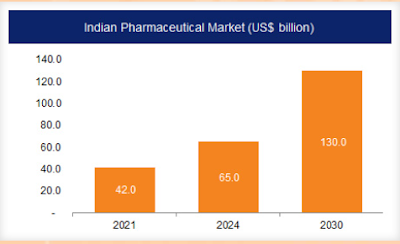Written By : Srividya.
The Indian pharmaceutical sector has developed over time into a robust industry, rising at a CAGR of 9.43% over the past nine years, and is currently ranked third in pharmaceutical output by volume. Some of the key sectors of the Indian pharmaceutical business include generic drugs, over-the-counter medicines, bulk meds, vaccines, contract research & manufacturing, biosimilars, and biologics. India is home to the most US Food and Drug Administration (USFDA)-compliant pharmaceutical production facilities, with 500 API companies accounting for around 8% of the global API market.
Over 50% of the world's demand for various
vaccines is met by the Indian pharmaceutical industry, as is 40% of the US
market for generic drugs and 25% of the UK market for all medicines. The
domestic pharmaceutical sector includes 3,000 drug companies and 10,000
production facilities. India occupies a key position in the global
pharmaceutical market. The country also has a big pool of scientists and
engineers who could advance the industry to new heights. Currently, Indian
pharmaceutical companies provide more than 80% of the antiretroviral
medications needed to treat AIDS (Acquired Immune Deficiency Syndrome)
throughout the world. India has earned the title of "pharmacy of the
world" thanks to the affordable prices and superior quality of its
pharmaceutical products.
Market Size
Source: IBEF
India is the biggest producer of generic drugs
in the world, contributing 20% of the total volume supply and 60% of the demand
for vaccines worldwide. Worldwide, the pharmaceutical industry in India is
valued at $42 billion. The Indian pharmaceutical market grew by 17.7% yearly in
August 2021, up from 13.7% in July 2020. India Ratings & Research predicts
that the Indian pharmaceutical market would generate over 12% Y-o-Y growth in
sales in FY22.
India is the world's No. 12 exporter of
medical supplies. More than 200 nations throughout the world receive Indian
medications for export, with the US serving as the largest market. The country
is the world's leading supplier of generic medicines with 20% of global exports
made up of generic drugs. In June 2022, Indian pharmaceutical and medicine
exports totalled $2,119.08 million USD.
With a cumulative outlay of Rs. 6,940
crores (US$ 951.27 million) from FY21 to FY30, the Department of
Pharmaceuticals introduced the PLI scheme to boost domestic manufacturing by
establishing greenfield facilities with minimal domestic value addition in four
discrete "Target Segments." This was done to achieve self-reliance
and reduce import dependency on the nation's essential bulk drugs.
India's pharmaceutical sector contributes
significantly to the country's exports and has attractive prospects for
investment. India also runs a sizable number of facilities that adhere to Good
Manufacturing Practices (GMP) standards set by the World Health Organization
(WHO) and the United States Food and Drug Administration. Millions of people
around the world receive affordable and low-cost generic medications from India
(USFDA). India has traditionally retained the top position among countries that
make pharmaceuticals. Over the next five years, India's medical spending is
expected to increase by 9–12%, making it one of the top 10 countries in the
world. Future domestic sales growth will also be influenced by companies'
capacity to focus their product portfolios on chronic therapies for diseases
including cardiovascular, anti-diabetes, anti-depressants, and anti-cancers,
which are on the rise. The Indian government has taken numerous measures to cut
costs and lower healthcare costs. The opening of pharmacies that provide
low-cost generic medications as well as other government initiatives, such as
the National Health Protection Scheme, which aims to provide universal
healthcare, the aging population, the rise in chronic diseases, and other
factors should all help to strengthen the Indian pharmaceutical industry. The
quick entry of generic medications into the market has remained a priority and
is anticipated to help Indian pharmaceutical companies. Additionally, the focus
on preventive immunizations, life-saving medications, and rural health programs
bode well for the pharmaceutical industry.
It’s “the time” for Pharmaceutical business owners to focus on their franchise business expansion and attract Investments, and business partners by franchising their pharmaceutical business. Connect with Sparkleminds today for all your franchise-related queries. Sparkleminds have 500+ franchise successful & satisfied clients, now it’s your turn! Join the successful community to achieve great heights in business. Act now!


.png)
